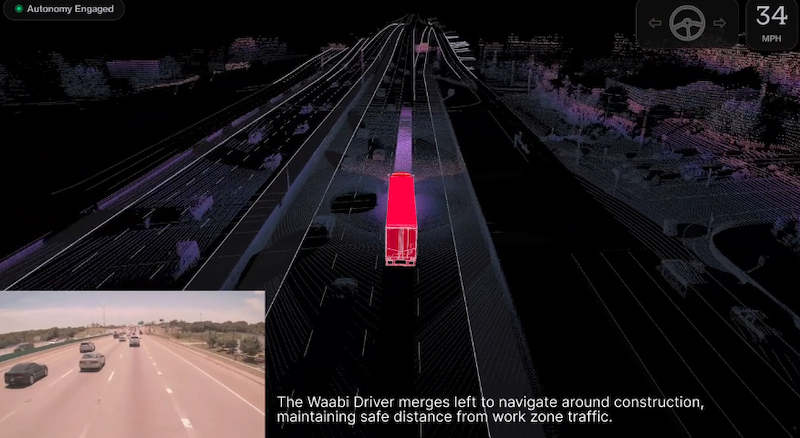Waabi says it has achieved a major technical and commercial breakthrough in autonomous trucking, unveiling surface-street driving capabilities that allow its self-driving trucks to complete entire freight journeys without human intervention.
The company claims it has now accomplished “complete autonomous driving capabilities across both highways and general surface streets”, a milestone it achieved in the first quarter of 2025.
According to Waabi, this unlocks what it describes as the first viable direct-to-customer operating model in the autonomous freight sector.
Waabi says the freight industry needs autonomous trucks that “complete entire logistics journeys”, not just highway segments.
Until now, most developers have pursued a hub-to-hub model, limiting autonomous operation to fixed highway corridors and relying on manual hand-offs for first- and last-mile segments. Waabi argues this adds “cost and friction” while restricting the types of shippers that can adopt the technology.
The company says it began expanding into the more complex domain of surface streets in 2024, focusing on the local roads “where all freight journeys begin and end”.
Surface-street environments, it notes, require safe navigation of unpredictable and high-density conditions — including “erratic pedestrians and cyclists, complex intersections, unprotected turns with poor visibility, varied traffic light patterns, and tight manoeuvers”.
By early 2025, Waabi says its system – known as the Waabi Driver – was capable of handling both environments. The company describes the Waabi Driver as “the only verifiable end-to-end AI model with reasoning capabilities that provide true generalization”, enabling it to scale safely across different operational design domains.
This dual-domain capability underpins Waabi’s pitch for a direct-to-customer model, where the autonomous truck “completes the entire journey rather than relying on fixed routes and hand-offs”.
The company emphasises that more than 40 per cent of tractor-trailer miles in the US occur on surface streets, representing nearly 84 million miles annually. Unlocking this segment, it says, expands the serviceable market and makes autonomy accessible to a wider range of shippers.
Early industry partners appear to support the approach. Waabi highlights its relationship with Uber Freight, which has enabled customers such as Samsung to deploy the technology.
Matt Do, senior manager at Samsung Electronics America, said: “A direct-to-customer model, like the one Waabi offers, is the only truly scalable approach for autonomous truck deployment because it mirrors our current operations and can be leveraged across our whole network.
“There isn’t the added friction of complex hand-offs or geographical limitations, so we can fully realize the efficiency gains of this exciting technology.”
Waabi says it is now laying the groundwork for commercial autonomy at scale.
“Our vision has always been to enhance the physical world through AI and to unlock the full potential of autonomous technology to solve real-world problems,” the company said.
“With the incredible momentum we’ve had over the past few months, we are closer than ever to making that vision a reality.”

